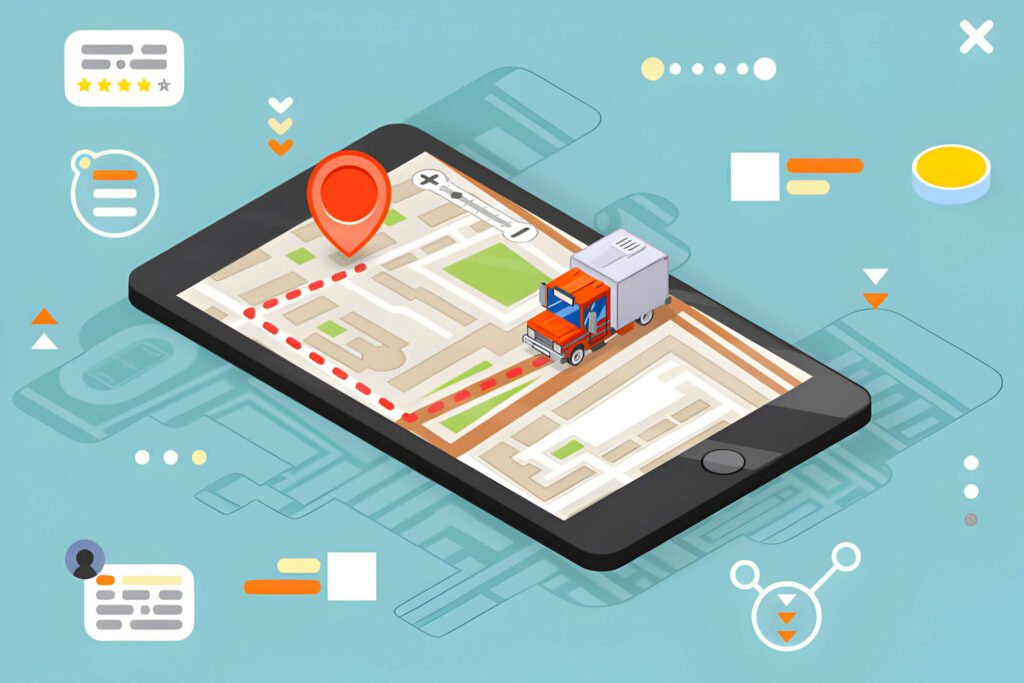The dumpster rental industry has seen rapid growth in recent years, with more construction, renovation, and waste management projects utilizing temporary dumpsters for debris removal. Dumpster rental companies manage fleets of dumpster containers that are delivered, picked up, and hauled to landfills or recycling centers.
Operations involve coordinating driver routes, tracking dumpster locations, managing customer bookings and availability, billing for rental fees and overages, and optimizing utilization of the dumpster fleet. As the business scales, juggling all these logistics manually becomes extremely inefficient. This is where implementing the best dumpster rental software becomes critical.
The right software solution can provide numerous benefits for dumpster rental operations including:
- Automated booking and reservation management – Customers can check availability and book dumpsters online 24/7. The software manages the schedule and dispatching.
- Container tracking – GPS and barcode scanning tracks dumpster locations and status. Drivers use mobile apps to efficiently service routes.
- Route optimization – Planning the best routes reduces mileage and fuel costs.
- Invoicing and billing – Automatic generation of invoices from rental fees, overages, and extras.
- Reporting and analytics – Insights into utilization, operational costs, profitability, and customer base.
- Scalability – Manage growing business without adding staff.
By implementing an integrated software solution designed for the dumpster rental vertical, companies can gain the above benefits to improve efficiency, reduce costs, provide better customer service, and support growth. The rest of this guide covers what to look for when selecting quality software for your dumpster rental business.
Must-Have Features
When evaluating the best dumpster rental software, there are several key capabilities to look for that can optimize operations and boost revenue.
Online Reservations/Bookings
The software should provide an online portal for customers to book and reserve dumpsters. This allows for 24/7 self-service bookings and frees up staff from manual booking processes. Customers should be able to check real-time container availability, select size/type, choose delivery dates, enter delivery addresses, and complete prepaid bookings online.
Container Tracking
Robust container tracking functionality is essential for managing assets and deliveries. GPS tracking allows you to monitor the location of all containers and trucks in real-time. This ensures accuracy of asset utilization data and improves accountability. Tracking capabilities like geofencing alerts and custom map views are useful.
Route Optimization
Route planning and optimization is key for maximizing fleet productivity. The software should use algorithms to map out the most efficient delivery routes and sequences daily. This minimizes mileage and fuel costs. Drivers have turn-by-turn navigation and dispatchers can track progress.
Billing and Invoicing
The system should automatically generate invoices and manage billing based on rental terms. Customers can pay invoices online via credit card or ACH. You can configure rates, taxes, fees, discounts, etc. There are tools for managing accounts receivable, invoicing workflows and payment processing.
Reporting and Analytics
Robust reporting allows for data-driven decisions. Look for standard reports on utilization, revenue, customers, etc. Custom reports can track KPIs like revenue per truck, customer retention, operational costs, etc. Data visualizations and dashboards provide insights. Integrations with accounting software also enable financial reporting.
3 Best Dumpster Rental Software
Dumpster Rental Systems
Dumpster Rental Systems is one of the leading providers of dumpster rental software. Their platform is designed specifically for the dumpster rental industry, with specialized features like container tracking, route optimization, and integrated billing. Key capabilities include:
- Online reservations and booking management
- Real-time visibility into container availability
- GPS tracking of containers
- Automated route planning to optimize driver efficiency
- Digital proof of delivery with photos and electronic signatures
- Integrated invoicing and accounts receivable
- Custom branded customer portal
- Robust reporting and analytics
Dumpster Rental Systems offers both cloud-based and on-premise deployment options. They focus on ease of use while still providing deep functionality for dumpster rental operations of all sizes. Their software can integrate with accounting systems, CRMs, and dispatching software.
AMCS
AMCS offers a cloud-based platform designed for the waste, recycling, and resource management industry. Their software has specialized capabilities for rental and hauling companies. Key features include:
- Container rental management
- Automated booking and dispatching
- Weighing integration at scales
- Route optimization and navigation
- Container tracking with GPS
- Digital proof of service records
- Billing based on weight, time, or other metrics
- Customer self-service portal
- Reporting and business intelligence
AMCS provides an end-to-end solution suitable for large waste management fleets. Their software can integrate with other systems through API and EDI options. They focus on automation and mobility for container rental workflows.
Wasteplace
Wasteplace provides a purpose-built cloud platform for the dumpster rental industry. Their software aims to modernize operations and make processes more efficient. Key capabilities:
- Online ordering for customers
- Real-time rental management
- Automated dispatching
- Route optimization
- Container tracking via GPS
- Digital delivery and pickup verification
- Flexible billing options
- Account management portal
- Reporting and analytics
Wasteplace offers rapid implementation and onboarding. Their platform can integrate with accounting software, payment gateways, and other systems. Wasteplace provides a modular system that can be customized for companies of different sizes.
Implementation Considerations
When implementing new dumpster rental software, waste management companies should consider several key factors to ensure a successful rollout.
Cloud vs On-Premise
A major decision is whether to use cloud-based software or an on-premise installed solution. Cloud solutions are accessed online, with the software hosted on the vendor’s servers. This makes for easier access and automatic updates, without needing in-house IT infrastructure. However, some companies prefer an installed on-site system for greater control, customization, and data security.
Mobile Access
Look for a software platform that provides strong mobile access and features. Field workers will need mobile apps to dispatch, schedule pickups and dropoffs, scan QR codes, take photos, and access real-time information on their phones or tablets. This boosts productivity and customer service.
Integrations
Evaluate what other software systems the dumpster rental platform can integrate with, like accounting, CRM, ERP, or GPS tracking. API and open database connectivity allows data to flow between programs. This reduces manual entry and ensures all systems are synced.
Customization and Scalability
Consider the level of customization available to tailor the software to your workflows. Also ensure the system can scale up as your business grows in size and complexity.
Security
Cloud systems should have robust security like encryption, backups, and access controls. On-premise systems will rely more on your company’s security methods. Review what measures are in place to protect sensitive customer and company data.
Support and Training
Look for vendors that provide ongoing technical support, resources, and training to administrators and users. This helps smooth the implementation process and allows you to get the most value from the software.
Pricing Overview For The Best Dumpster Rental Software
When evaluating the best dumpster rental software, pricing is an important factor to consider. Here’s an overview of cost ranges for some of the top solutions:
- Dumpster Rental Systems – Starts at $99/month for up to 10 users. Additional pricing tiers up to $399/month for unlimited users.
- AMCS – Custom quote required. Mid-range pricing from $150 – $300/month based on number of users and features.
- Wasteplace – Starts at $99/user/month. Volume discounts available.
- Docket – Starts at $89/month per user. Enterprise pricing available.
- Dispatcher – Starts at $200/month per user, with custom enterprise pricing options.
- ServiceCore – Starts at $350/month for core features, enterprise pricing available.
- Reservety – Starts at $99/month per user, enterprise pricing available.
- RentMy – Starts at $79/month per user, volume discounts available.
Pricing can vary widely based on the number of users, vehicles, custom features, and integrations required. Be sure to get detailed quotes from vendors based on your specific needs. Some solutions offer attractive discounts for annual contracts over monthly payments. Cloud-based systems tend to have more flexible and scalable pricing than installed on-premise options.
Selection Criteria
When selecting new dumpster rental software, there are several key factors to consider:
Company Size
The size of your waste management company will impact your software needs. Small businesses may only require basic functionality, while larger enterprises need robust features to manage high volume. Assess your fleet size, number of customers and locations, and growth plans when evaluating solutions. Opt for scalable software that can expand as your operations grow.
Current Processes
Consider how much you want to optimize current workflows versus adapting processes to new software capabilities. Examine pain points in your existing dumpster rental operations and look for a solution to target those areas, whether it’s dispatching, billing, reporting, etc. But also determine if you’re open to changing processes to leverage the full potential of new technology.
Budget
Pricing can vary widely for dumpster rental software based on capabilities, customization, number of users, etc. Have a clear budget in mind and look for solutions that provide the functionality you need at an affordable cost. Some vendors provide quotes based on your specific requirements. Focus on value over just lowest initial cost.
Needed Capabilities
Make a list of must-have features based on your operational needs, along with nice-to-have capabilities. Ensure prospective software can handle essentials like container tracking, route optimization, reservations, invoicing, etc. But also consider areas you want to improve – reporting, automation, integration with other systems, etc. Prioritize core dumpster rental functionality first when evaluating options.
Future Trends in Dumpster Rental Software
As technology continues to evolve, so does the dumpster rental software. Here are some future trends that we can expect in this field:
- Artificial Intelligence and Machine Learning: AI and ML are increasingly being used in business software, and dumpster rental software is no exception. These technologies can be used for predictive analytics, such as predicting when a dumpster will be full and need to be emptied, or for optimizing routes based on traffic and other factors.
- Mobile Applications: As more and more people use their smartphones for everything from shopping to managing their businesses, we can expect to see more dumpster rental software offering mobile applications. This will allow business owners to manage their dumpster rental operations from anywhere, at any time.
- Increased Integration: As businesses use a variety of software systems, there is a growing need for these systems to be able to communicate with each other. Therefore, we can expect to see more dumpster rental software offering integrations with other business systems, such as accounting software or customer relationship management (CRM) systems.
- Sustainability Features: As sustainability becomes a more important factor in business operations, we can expect to see more dumpster rental software offering features that help businesses reduce their environmental impact. This could include features that help businesses track and reduce their waste, or features that help businesses optimize their routes to reduce fuel consumption.
These trends will not only make dumpster rental software more efficient and effective, but also more aligned with the changing needs and values of businesses and society.
Cloud vs On-Premise
When selecting the best dumpster rental software, one of the key decisions is whether to use a cloud-based or on-premise solution. There are pros and cons to each approach:
Cloud-Based Software
Pros
- Accessible from anywhere with an internet connection
- Automatic updates and maintenance handled by the vendor
- Scales easily as your business grows
- Lower upfront costs compared to on-premise
- Subscription pricing spreads costs over time
Cons
- Reliant on internet connectivity
- Potential security and privacy risks
- Less control and customization
- Recurring subscription fees
On-Premise Software
Pros
- Recurring subscription fees
- Full control over software environment
- Customize and configure to your needs
- One-time license fee
- Keep data on your servers
- Keep data on your servers
- Operate independently of internet
Cons
- Large upfront license purchase
- Responsible for maintenance and updates
- Limited by internal infrastructure
- Difficult to scale across locations
- Users can only access on company network
Overall, cloud systems offer more flexibility and scalability, while on-premise provides more control and customization. Companies should weigh their budget, IT resources, business needs and growth plans when deciding between the two models. Both can be viable options for dumpster rental operations.
Mobile Access
Mobility is a key consideration when selecting dumpster rental software. You’ll want a solution that provides easy access and management capabilities from mobile devices like smartphones and tablets. This allows you and your staff to handle bookings, track containers, and access data from anywhere.
The best options will provide native mobile apps for iOS and Android, in addition to responsive web platforms that adapt to any screen size. Mobile apps offer the benefit of full offline functionality, push notifications, and access to device features like GPS and cameras. This enables real-time container tracking, proof of delivery, image capture, and communication while out in the field.
On the other hand, mobile-friendly web platforms provide cross-device accessibility without the need to download apps. The choice depends on your specific business needs. Larger companies may benefit most from the advanced features of custom mobile apps, while smaller teams may find web access sufficient.
When evaluating solutions, test the mobile experience thoroughly. You’ll want to ensure bookings, tracking, communication, and data look great and function seamlessly on both smartphones and tablets. Going mobile can significantly boost productivity and responsiveness for your team. The right software solution should provide robust and intuitive mobile access out of the box.
Integrations
Integrating your dumpster rental software with other business systems is key for streamlining operations. The software should seamlessly integrate with:
- Accounting Software: Connecting your rental software with accounting software like QuickBooks allows for automated invoicing, payment processing, and financial reporting. This eliminates duplicate data entry and ensures your books are always up to date.
- CRM Software: Integration with CRM platforms like Salesforce allows rental data to flow into your centralized customer database. This provides a complete view of each customer and enables better customer support.
- Dispatching Software: Integration with route optimization and dispatching tools allows real-time updates on driver locations, service status, and container availability. This improves scheduling and asset tracking.
- Fleet Maintenance Software: Linking with fleet and asset management solutions allows rental data to connect with vehicle maintenance records. This helps optimize preventative maintenance.
- Payment Gateways: Integrating with payment processors like Stripe or PayPal enables online payment acceptance and automation within the rental platform.
- Email Marketing Tools: Syncing your contacts and customer data with email services like MailChimp allows for targeted email campaigns and promotions based on rental history.
- Mapping/Geocoding APIs: Integration with mapping APIs ensures accurate location data across the platform, powering proximity-based search and geospatial reporting.
- Document Management Systems: Connecting with cloud storage services or content management systems enables centralized storage and management for contracts, invoices, photos and other rental documents.
- Custom Software Extensions: Open APIs allow dumping rental platforms to be customized through proprietary software extensions or third-party add-ons. This enables unique integrations.
Selecting a dumpster rental system with robust integration capabilities ensures you can connect with the other software platforms your business relies on for a streamlined workflow.
Conclusion
Selecting the right dumpster rental software is crucial for waste management companies looking to improve operations and scale their businesses. The key takeaways when evaluating solutions are:
- Cloud-based software offers more flexibility and accessibility over installed systems. Web and mobile access enables remote management and real-time visibility.
- Integration capabilities are important to connect the software with existing platforms like accounting, CRM and dispatch systems. API and webhook support makes this easier.
- Tracking, routing and optimization features should be robust to maximize fleet usage, reduce miles driven and improve customer service.
- The solution should be customizable to match current and future business processes, with scalable pricing models.
- Both small and large providers can benefit from purpose-built software, but costs and features will vary.
Based on the solutions reviewed, Dumpster Rental Systems stands out as the top recommendation. It offers all the core functionality needed specifically for dumpster rentals, along with advanced optimization and automation tools. The software is highly customizable, with transparent pricing and strong customer support. For small to mid-sized companies, Dumpster Rental Systems provides the best value and technology. Larger enterprises may require a more tailored approach from vendors like AMCS or Wasteplace.

Aspiring U.S. Attorney with a Heart for Justice and Culture | Currently navigating the intricate path of U.S. law, I’m dedicated to becoming a skilled attorney. My journey intertwines the vibrancy of Reguetón and the rich cultural heritage of Cuba and Puerto Rico. From the breathtaking landscapes of Napoli-Salerno to the diverse cultures of Italy, Colombia, and the United States, my life is a tapestry of diverse experiences. And here, I’ll be your legal guide for your Scrap Safari in different states to keep you safe from every problem.


